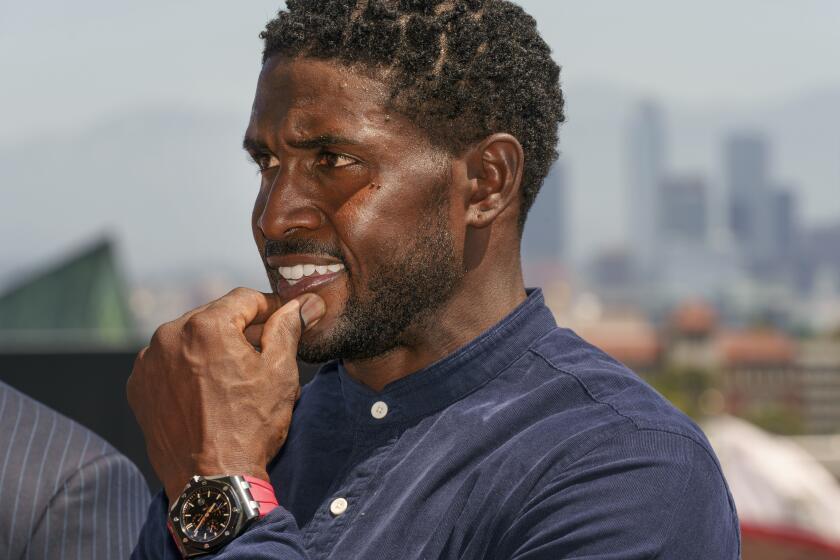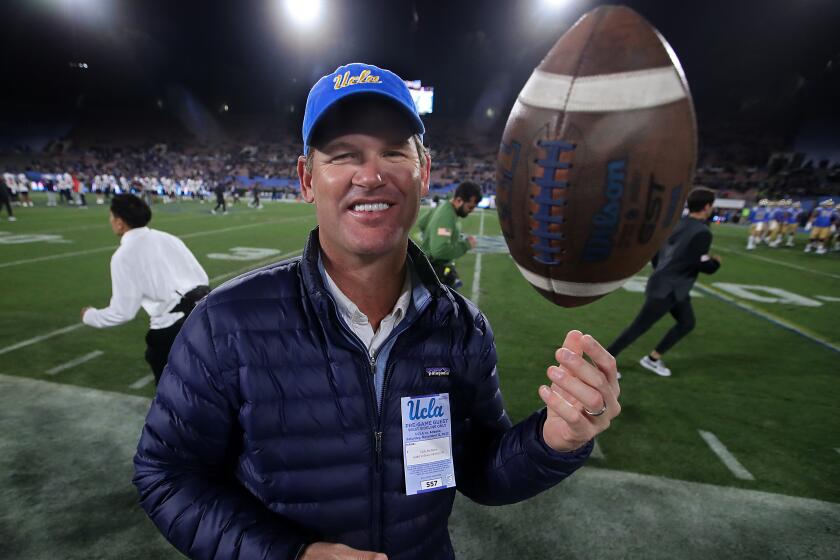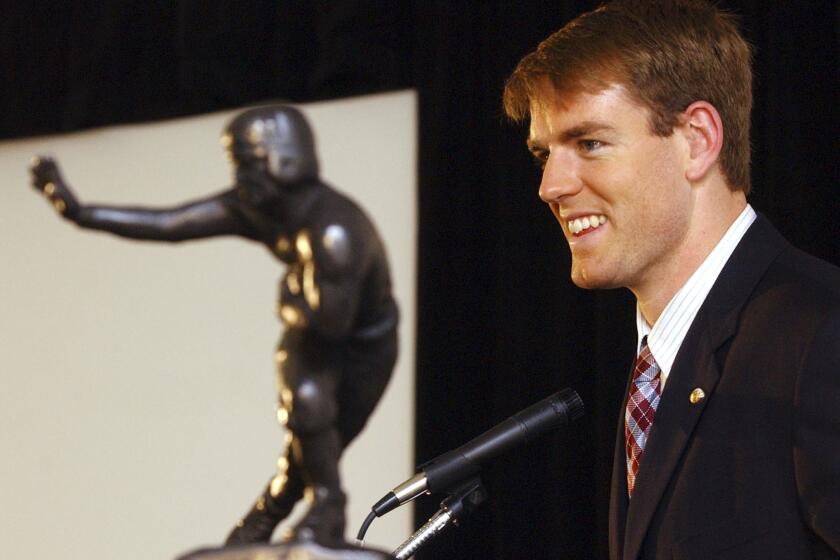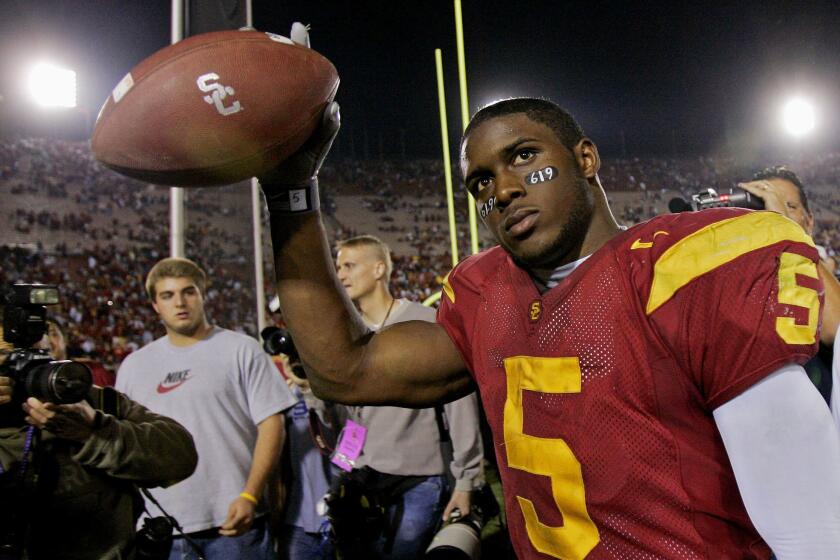Clay Helton’s stoicism, criticized early, has steadied USC as schedule eased
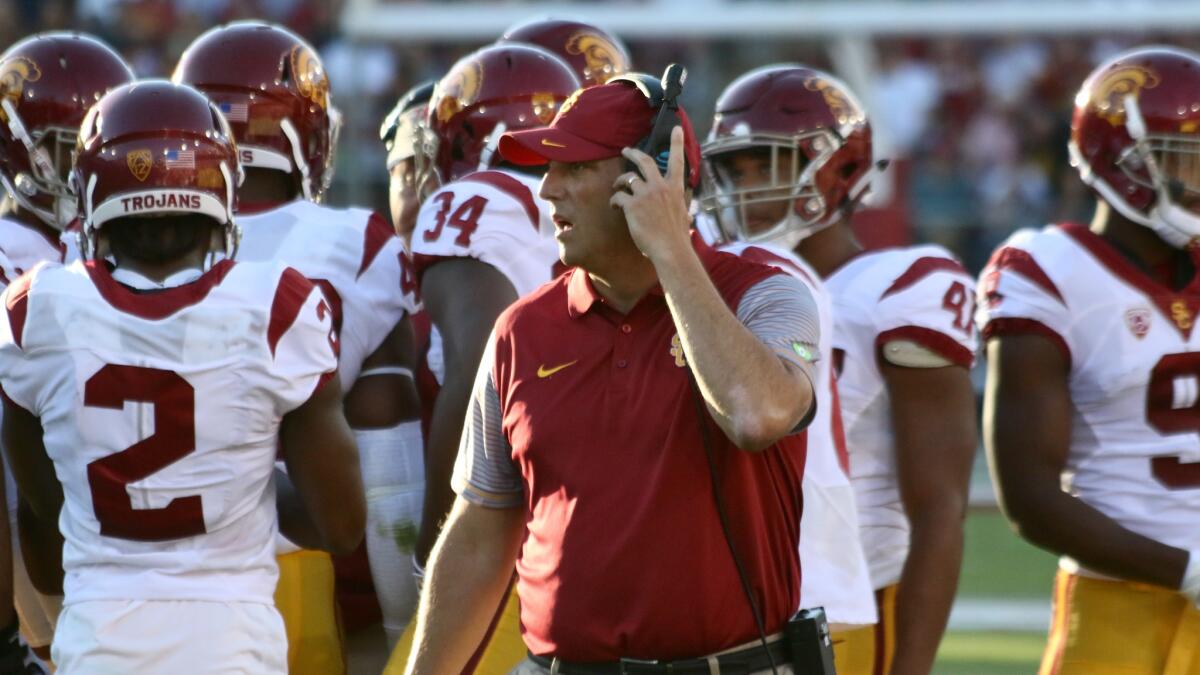
No one except Clay Helton himself knows how he spent the few hours between the most brutal game of his life and the moment he showed up at the apartment he shared with friends later that night.
Helton, then a backup quarterback at Houston, had been pummeled and sacked so hard by Texas A&M it was a wonder there weren’t dents left in the sod at Robertson Stadium. By the end of the game, the crowd ran him off the field with a cascade of boos.
His friends mostly let him be. They know he iced down afterward. The next anyone saw of him, he was back home, upbeat and positive. Same as ever.
Chad O’Shea, his fellow Houston quarterback, said it was a time in Helton’s life that prepared him to be a head coach.
“I think that we learned more from that adversity that I think it affected our coaching style to this day,” O’Shea, the receivers’ coach of the New England Patriots, said this summer. “How things aren’t always gonna go the way you want it to, and there’s going to be some adverse circumstances and you’re just gonna have to deal with it.”
Helton has internalized that lesson as evidence of the importance of stoicism. As USC’s coach, he can be Spock-like on the sideline. After games, he is almost always upbeat. That approach frustrated some USC fans after early losses this season.
After USC’s loss to Stanford, Helton praised the team’s fight even as backup quarterback Sam Darnold said, “It looked like the game was over in the locker room” at halftime.
It is not delusion, Helton says, but encouragement. As USC has worked back into the Pac-12 Conference’s South division race, Helton’s dispassionate approach has had a calming effect.
Amid a losing streak that dropped USC to 1-3, safety Chris Hawkins said it was Helton’s demeanor that signaled: Don’t panic.
“He’s handling the pressure well,” Hawkins said at the time. “He’s keeping our spirits up. He’s keeping his own spirits up.”
USC won its next two games with its two best performances of the season, and now the Trojans have another key game at Arizona on Saturday.
Most football coaches are more demonstrative. When Alabama Coach Nick Saban was asked about a sideline “argument” he had with offensive coordinator Lane Kiffin earlier this season, he responded dryly, “There are no arguments. Those are called ass-chewings.”
During games, Helton is not one to chew anyone out. Three turnovers against Colorado last weekend turned a dominant performance into a nail-biter, but Helton said he swallowed his rising frustration.
In a sideline huddle late in the game, tight end Tyler Petite said, Helton spoke matter-of-factly, explaining assignments and offering encouragement.
“You learn it being a quarterback and growing up in the trade,” Helton said. “Because you’re looked at every snap by your team, whether you’re a quarterback, whether you’re a coach. And the way you react, they’re going to react.”
Helton’s steadiness has navigated USC away from its rocky start. But some critics have argued, a little more fire could’ve helped avoid that start altogether.
After a controversial punt late against Utah, Helton said he might have tried to go for it had USC been closer to the first-down marker. But Helton chose not to argue an iffy spot on third down.
“I just trusted the official to make his spot,” he explained later.
Helton’s philosophy also calls for empowering his players through trust. Against Stanford, the approach might have delayed a needed adjustment. Helton was slow to fix a false-start problem after USC was penalized six times. Guard Viane Talamaivao was responsible for five of those infractions yet stayed in the game.
Helton said that screaming can be appropriate but usually only in “private settings.”
“I believe that meetings and in-game, you might as well be a high school teacher,” he said. “You know, it’s about communication and giving the information that’s going on in the game and correcting things.”
Showing trust, he said, is important.
“If they know that you have confidence as a coach, I think it just rubs off on them,” he said.
Players this week said Helton helped them regain their own confidence. Much of USC’s budding turnaround can be credited to the emergence of Darnold and an easier stretch of the schedule. But Helton’s composure avoided a collapse.
That was all that was needed to keep USC alive in a messy South division. All teams remain in contention, with Arizona (2-4, 0-3 in the Pac-12) possibly the exception. USC (3-3, 2-2) still needs help — Utah has one fewer loss and owns the head-to-head tiebreaker.
After practice Thursday, Helton acknowledged that he has started to peek at the out-of-town scoreboard.
“It’s anybody’s ballgame,” he said, with a typical hint of optimism.
Follow Zach Helfand on Twitter @zhelfand
Go beyond the scoreboard
Get the latest on L.A.'s teams in the daily Sports Report newsletter.
You may occasionally receive promotional content from the Los Angeles Times.
